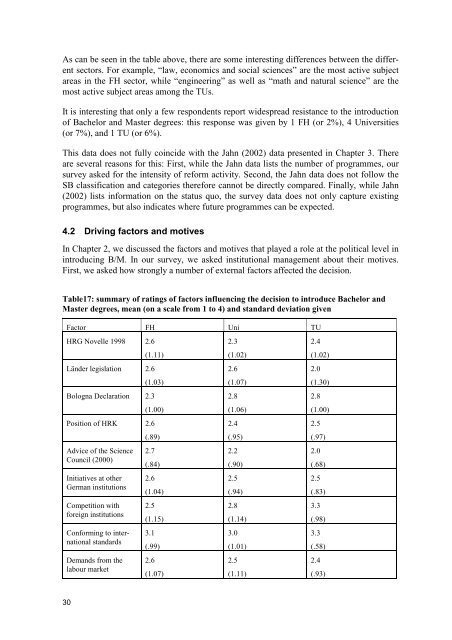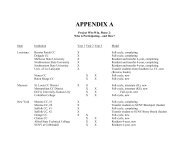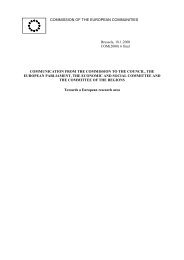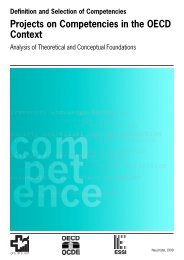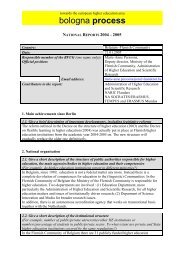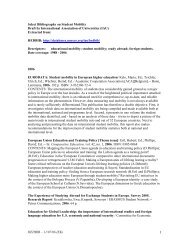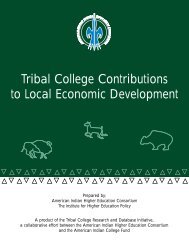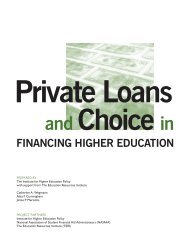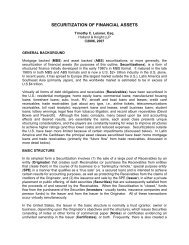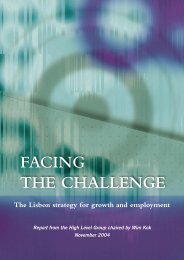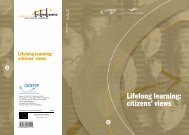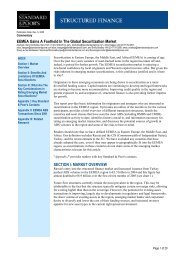As can be seen <strong>in</strong> the table above, there are some <strong>in</strong>terest<strong>in</strong>g differences between the differentsectors. For example, “law, economics <strong>and</strong> social sciences” are the most active subjectareas <strong>in</strong> the FH sector, while “eng<strong>in</strong>eer<strong>in</strong>g” as well as “math <strong>and</strong> natural science” are themost active subject areas among the TUs.It is <strong>in</strong>terest<strong>in</strong>g that only a few respondents report widespread resistance to the <strong>in</strong>troductionof Bachelor <strong>and</strong> <strong>Master</strong> degrees: this response was given by 1 FH (or 2%), 4 Universities(or 7%), <strong>and</strong> 1 TU (or 6%).This data does not fully co<strong>in</strong>cide with the Jahn (2002) data presented <strong>in</strong> Chapter 3. Thereare several reasons for this: First, while the Jahn data lists the number of programmes, oursurvey asked for the <strong>in</strong>tensity of reform activity. Second, the Jahn data does not follow theSB classification <strong>and</strong> categories therefore cannot be directly compared. F<strong>in</strong>ally, while Jahn(2002) lists <strong>in</strong>formation on the status quo, the survey data does not only capture exist<strong>in</strong>gprogrammes, but also <strong>in</strong>dicates where future programmes can be expected.4.2 Driv<strong>in</strong>g factors <strong>and</strong> motivesIn Chapter 2, we discussed the factors <strong>and</strong> motives that played a role at the political level <strong>in</strong><strong>in</strong>troduc<strong>in</strong>g B/M. In our survey, we asked <strong>in</strong>stitutional management about their motives.First, we asked how strongly a number of external factors affected the decision.Table17: summary of rat<strong>in</strong>gs of factors <strong>in</strong>fluenc<strong>in</strong>g the decision to <strong>in</strong>troduce Bachelor <strong>and</strong><strong>Master</strong> degrees, mean (on a scale from 1 to 4) <strong>and</strong> st<strong>and</strong>ard deviation givenFactor FH Uni TUHRG Novelle 1998 2.6(1.11)Länder legislation 2.6(1.03)Bologna Declaration 2.3(1.00)Position of HRK 2.6(.89)Advice of the ScienceCouncil (2000)Initiatives at other<strong>German</strong> <strong>in</strong>stitutionsCompetition withforeign <strong>in</strong>stitutionsConform<strong>in</strong>g to <strong>in</strong>ternationalst<strong>and</strong>ardsDem<strong>and</strong>s from thelabour market2.7(.84)2.6(1.04)2.5(1.15)3.1(.99)2.6(1.07)2.3(1.02)2.6(1.07)2.8(1.06)2.4(.95)2.2(.90)2.5(.94)2.8(1.14)3.0(1.01)2.5(1.11)2.4(1.02)2.0(1.30)2.8(1.00)2.5(.97)2.0(.68)2.5(.83)3.3(.98)3.3(.58)2.4(.93)30
Note: Not all respondents answered all questions, the number of responses therefore varies from factor to factor 33 . *<strong>Higher</strong>mean (first number given) <strong>in</strong>dicates a higher relative importance, while higher st<strong>and</strong>ard deviation (given <strong>in</strong> parentheses)<strong>in</strong>dicates a higher level of disagreement among the respondents. Source: CHEPS/CHE Survey data.St<strong>and</strong>ard deviations (the numbers <strong>in</strong> parentheses) <strong>in</strong>dicate the level of agreement among therespondents. St<strong>and</strong>ard deviations higher than 1.00 <strong>in</strong>dicate relatively high levels of disagreement.As can be seen <strong>in</strong> the table, there were, therefore, many questions for whichthere were relatively high levels of disagreement among the respondents <strong>in</strong> each sector. Thefactor which scored the highest <strong>in</strong> all three sectors (although with a fairly high level of disagreement<strong>in</strong> the university sector) was the importance of conform<strong>in</strong>g to <strong>in</strong>ternational st<strong>and</strong>ards.Another factor rank<strong>in</strong>g equally high <strong>in</strong> the TU sector was competition with foreign<strong>in</strong>stitutions 34 . The advice of the Science Council (2000) was seen as not very important <strong>in</strong>the university sector <strong>and</strong> among the TUs. The university sector also ranked the HRGNovelle 1998 as hav<strong>in</strong>g relatively little <strong>in</strong>fluence, but with a relatively high level of disagreement.The FHs, on the other h<strong>and</strong>, <strong>in</strong>dicated that the Bologna Declaration was lessimportant (this ranked much higher <strong>in</strong> the university <strong>and</strong> TU sectors, but <strong>in</strong> all three sectorsthere was a fairly high level of disagreement amongst the respondents). L<strong>and</strong>er legislationwas not considered very important among the TUs, <strong>and</strong> was considered somewhat moreimportant <strong>in</strong> the other two sectors, although there was a fairly high level of disagreement <strong>in</strong>all three sectors. In none of the sectors, dem<strong>and</strong>s from the labour market were considered amajor driv<strong>in</strong>g force.Another question asked what hopes the <strong>in</strong>stitutions had with regard to the <strong>in</strong>troduction ofBachelor <strong>and</strong> <strong>Master</strong> degrees (Table 18, below). While the previous question referred toexternal factors, this question asked for <strong>in</strong>stitutions’ own motives for <strong>in</strong>troduc<strong>in</strong>g the newdegrees. In comparison with the answers given above (Table 16) there was much moreagreement here regard<strong>in</strong>g how high or low the various items were ranked (the st<strong>and</strong>ard deviationsare generally much lower). Items which <strong>in</strong>stitutions <strong>in</strong> all three sectors rankedhighly were: 1) the hope of <strong>in</strong>creas<strong>in</strong>g student mobility, 2) improv<strong>in</strong>g the <strong>in</strong>ternational competitiveposition, <strong>and</strong> 3) attract<strong>in</strong>g foreign students 35 . Items which ranked low <strong>in</strong> all threesectors were: 1) the hope of collect<strong>in</strong>g <strong>in</strong>come from tuition fees <strong>in</strong> the medium-term, <strong>and</strong> 2)the hope of strengthen<strong>in</strong>g the practical orientation. An item that ranked particularly low <strong>in</strong>the university <strong>and</strong> TU sectors (but was somewhat more important <strong>in</strong> the FH sector) was thatof strengthen<strong>in</strong>g the research orientation. Another item where some differences between thesectors can be seen concerns the hope of reduc<strong>in</strong>g drop-out rates: this item was ranked low<strong>in</strong> the FH sector <strong>and</strong> among the TUs, but somewhat higher <strong>in</strong> the university sector 36 . Shorten<strong>in</strong>gstudy times was considered less important <strong>in</strong> the FH sector than <strong>in</strong> the other two sectors37 .33 Non-response rates range from 13%, 11% <strong>and</strong> 0% (<strong>in</strong> the FH, Uni, <strong>and</strong> TU sectors, respectively) for thequestion about compet<strong>in</strong>g with foreign <strong>in</strong>stitutions to 21%, 23%, <strong>and</strong> 13% (<strong>in</strong> the FH, Uni, <strong>and</strong> TU sectors,respectively) for the question about the HRG Novelle 1998.34 This factor ranked high <strong>in</strong> the university sector as well, but with a fairly high level of disagreement, <strong>and</strong> itranked fairly low <strong>in</strong> the FH sector, but aga<strong>in</strong> with a fairly high level of disagreement.35 This item, however, ranked much higher <strong>in</strong> the TU sector, <strong>and</strong> <strong>in</strong> the FH sector there was a fairly high levelof disagreement.36 There was, however, a fairly high level of disagreement <strong>in</strong> the FH <strong>and</strong> university sectors.37 There was, however, a fairly high level of disagreement about this item <strong>in</strong> the university sector.31


